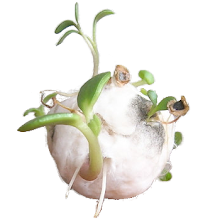Monday, February 2, 2015
No-GMO ... ever!
A customer recently asked me if I used no-GMO seeds. I realized that while I do say that I use only no-GMO seeds in all of my plantable papers in my Etsy shop, I don't give it more than a quick mention. And yet it is a fundamentally important part of my business and my mission statement.
So what does it mean when I say I never use GMO (genetically modified) seeds? It means a lot.
GMOs (or “genetically modified organisms”) are living organisms whose genetic material has been artificially manipulated in a laboratory through genetic engineering. This relatively new science creates unstable combinations of plant, animal, bacteria and viral genes that do not occur in nature or through traditional crossbreeding methods. This type of breeding allows the companies producing them to manipulate the seeds to help them financially and make the public dependent on buying more products from them. For instance, they create seeds that are terminal - they are sterile and do not reproduce new seeds so that consumers must continually buy new seeds from companies like Monsanto to continue having crops. Also, they can breed crops that are resistant to certain pesticides but will respond to - you guessed it - the pesticides that they produce, so they make even more money.
Now introduce pollination, which is so important to our foods. Bees populations are dying off because of the ingestion of GMO proteins. No bees, no food. The pollen from these flowers now blows onto other flowers and … cross-pollination. Frighteningly, this cross-pollination can never be reversed because it is now a part of the ecosystem. And don't even get me started on genetically modified foods. I make it a point to only buy heirloom tomatoes, for instance, from local farmers at the farmers market. The only way these breeds will stay alive is if consumers want them, buy them and ask for them.
WholeFoods had a really interesting campaign in one of their stores. They showed what their shelves would look like without bees pollinating food. Here's what the shelves looked like, before and after:
This photo, also courtesy of WholeFoods, shows what the dairy case in their market would look like without bees pollinating our foods.
“Sadly, we live in a world where if you do good things, there are no financial rewards. If you poison the earth, there is a fortune to be made.”
― June Stoyer
Subscribe to:
Post Comments (Atom)



No comments:
Post a Comment